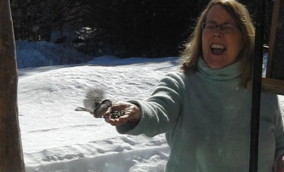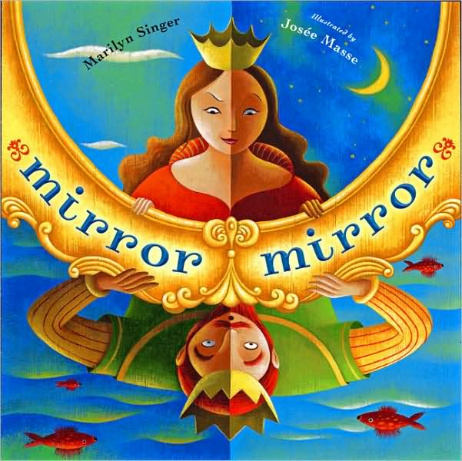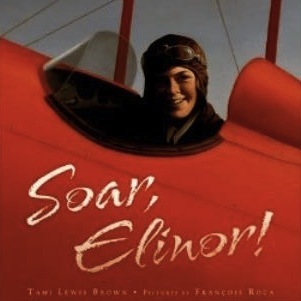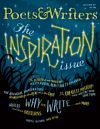Jeannine Atkins's Blog, page 37
February 22, 2011
Feed the Birds
Just so family in friends in warmer climates don’t think we never have fun in snowy Massachusetts, here’s a picture Peter took of me feeding a bold chickadee.

Published on February 22, 2011 12:30
February 20, 2011
Crossing the Borders of Blogging: A Happy Afternoon
On a day when we New Englanders were celebrating slush, water dripping from frozen eaves, and air with a scent, what a thrill it was to meet Melodye
![[info]](https://i.gr-assets.com/images/S/compressed.photo.goodreads.com/hostedimages/1380442897i/1319734.gif) newport2newport
who’d left hummingbirds nesting among green leaves to attend to family needs in New England. She found it hard to understand why we were gushing about fifty degrees, and in fact it was snowing later that day, but she heroically drove over potholes and parked on an icy slope to meet me for lunch.
newport2newport
who’d left hummingbirds nesting among green leaves to attend to family needs in New England. She found it hard to understand why we were gushing about fifty degrees, and in fact it was snowing later that day, but she heroically drove over potholes and parked on an icy slope to meet me for lunch.
It’s wonderful to get to know people through their blogs, but what a treat to get a smile not far from yours, to hear real laughter bubble, and pour not-virtual vanilla and cardamom tea. I like turning a bit of life into words on a screen, and Melodye and I bonded over our commitment to taking our time choosing words, but what a joy to let words spill and scatter. Eating tomato soup and melted cheese over artichokes on toast, we mentioned some of the craziness that works its way into all lives, and things interesting and mundane as favorite kinds of tea. We could expand on some gritty edges or darker times, delve a bit into struggles and triumphs with craft. Tell a few secrets, like how I don’t understand much of Emily Dickinson, which made Melodye laugh. Whoops, now you know, too.

I’ll likely forget much of what we said on a shared window seat, but never my sense of great good fortune to have met across a few thousands miles for a conversation based on knowing each other’s written words, then shimmying between the lines, snuggling into some of the stories in the margins.
Published on February 20, 2011 06:54
February 16, 2011
No Sandcastles
Sometimes writing can feel as carefree as building sand castles.
And sometimes I do not want to sit at my desk. Or window seat.
Today was that second kind of day. I muttered. I grumbled. I yelled at the dog (The cute one. Who is loud). I wished the phone would ring. Even if it was just a reminder about the dentist. Even if it was bad news, at least it would be a distraction. I made more tea. Ate half a lemon bar. I can’t believe that yesterday I called being in the middle of a book my favorite part of the writing process.
And finally got to work. Pushing around old sentences that didn’t sing. Pawing through words that seemed saggy. Feeling tired of my characters: why couldn’t a new and charming one show up?
Why isn’t the phone ringing when I want it to? Now even the dog isn’t barking.
But at last my characters started to seem a little bit interesting again. And pages completed got slightly longer. Tomorrow there’s always hope I’ll start on a better note. Remembering that sometimes there’s just a lot of terrible traffic on the way to the beach. And sometimes the sand looks kind of nasty. But something is better than nothing when it comes to castles or manuscripts, so it’s okay to whine to yourself, make peace with the dogs, maybe finish off the lemon bar, and see what you can find in the too bulky words and over-familiar characters.
Or sometimes you have to put down the virtual shovel and bucket and put on a very virtual jacket and black pants. Get out the virtual lint brush for dog hairs. And get to work.
And sometimes I do not want to sit at my desk. Or window seat.
Today was that second kind of day. I muttered. I grumbled. I yelled at the dog (The cute one. Who is loud). I wished the phone would ring. Even if it was just a reminder about the dentist. Even if it was bad news, at least it would be a distraction. I made more tea. Ate half a lemon bar. I can’t believe that yesterday I called being in the middle of a book my favorite part of the writing process.
And finally got to work. Pushing around old sentences that didn’t sing. Pawing through words that seemed saggy. Feeling tired of my characters: why couldn’t a new and charming one show up?
Why isn’t the phone ringing when I want it to? Now even the dog isn’t barking.
But at last my characters started to seem a little bit interesting again. And pages completed got slightly longer. Tomorrow there’s always hope I’ll start on a better note. Remembering that sometimes there’s just a lot of terrible traffic on the way to the beach. And sometimes the sand looks kind of nasty. But something is better than nothing when it comes to castles or manuscripts, so it’s okay to whine to yourself, make peace with the dogs, maybe finish off the lemon bar, and see what you can find in the too bulky words and over-familiar characters.
Or sometimes you have to put down the virtual shovel and bucket and put on a very virtual jacket and black pants. Get out the virtual lint brush for dog hairs. And get to work.
Published on February 16, 2011 12:50
February 15, 2011
Clinging to the Castle: Writing as Work or Play?
When I scoop my laptop from the breakfast table, fix another cup of tea, and tell my husband I’m going to work on some poems, sometimes it feels like that. A chore. A job. Hard.
But these days I have a lot of words to work with, which makes writing seem a little more like play. I might say there’s a skeleton, but that sounds creepy, or a map with roughed-out roads, but that makes it sound more structured than it is. I’m thinking of it as a kid who’s piled up a lot of sand for a castle. Some sand will turn into turrets. Some will be pushed down or collapse on its own. Some will be shaped into windows.
Lots of lots of attention must still be paid to details, but right now it’s more like play than work, even if, well, already wearing sweatpants, baggy sweater, and red wristlets to keep out the cold, I don’t look as serious as I’d like (the chance to wear better clothes is why some of us like to teach.) But I’m moving in and out of windows, exploring, tearing down, trying out the look of another balcony or level.
This is perhaps my favorite part of the writing process. I don’t have to wear blinders against the glare of the blank page. The copy editor in me can keep quiet, instead of staying vigilant for typos, puffy phrases, and too-wandering sentences.
Or wondering if I’ve left too many or not enough windows open, if they’re shuttered to just the right angle. So readers can get in but not get lost.
But these days I have a lot of words to work with, which makes writing seem a little more like play. I might say there’s a skeleton, but that sounds creepy, or a map with roughed-out roads, but that makes it sound more structured than it is. I’m thinking of it as a kid who’s piled up a lot of sand for a castle. Some sand will turn into turrets. Some will be pushed down or collapse on its own. Some will be shaped into windows.
Lots of lots of attention must still be paid to details, but right now it’s more like play than work, even if, well, already wearing sweatpants, baggy sweater, and red wristlets to keep out the cold, I don’t look as serious as I’d like (the chance to wear better clothes is why some of us like to teach.) But I’m moving in and out of windows, exploring, tearing down, trying out the look of another balcony or level.
This is perhaps my favorite part of the writing process. I don’t have to wear blinders against the glare of the blank page. The copy editor in me can keep quiet, instead of staying vigilant for typos, puffy phrases, and too-wandering sentences.
Or wondering if I’ve left too many or not enough windows open, if they’re shuttered to just the right angle. So readers can get in but not get lost.
Published on February 15, 2011 05:43
February 14, 2011
2010 Cybils Awards
Congratulations to all the Cybils Award winners (click for the link). Marilyn Singer's Mirror Mirror, illustrated by Josée Masse, won the award in poetry: you can click here for my review of this collection of fairy tales told in palindromes. It’s amazing how illuminating and fun it can be to read old tales from two directions.

It was exciting to have Borrowed Names named as a poetry finalist, along with Ubiquitous and Dark Emperor by Joyce Sidman, who masterfully pleats science and sounds, making connections intricate as overlapping feathers or scales, and Jessica Swaim’s book Scarum Fair, which combines chills and laughter. Honored here more in their roles as editors and compilers, working from their generosity as mentors and colleagues, are Lee Bennett Hopkins for Sharing the Seasons, a joyful collection, and Jane Yolen for Switching on the Moon, which celebrates nighttime rituals for the very young.

Thanks to the judges and all who work hard to make the Cybils happen. Getting their hands on books, reading, musing, discussing, wrestling time from other commitments to blogging, baking, yoga practices, running, communing with Jane Austen, teaching, writing their own poems, guiding and caring for children, and so many other things. Extra hugs and Valentine cookies to you all!
When you’re named a finalist of something and you know you have a chance it feels sad not to get the number one spot, even when you know odds are against the pinnacle and you love the winning book. But you remind yourself it was cool to be a finalist and go on, knowing the crowd of “almosts” or “not this time” is so much bigger than that tiny place on top. And the day isn’t too much changed. Cheers would be a lovely way to start the morning, but then it would be about setting aside the prize, just like sending disappointment to its corner, and turning to a window with its cloudy but marvelous view of all books yet to be written.
Which is the plan. Then I'm baking Jama’s lemon bars.

Published on February 14, 2011 08:53
February 11, 2011
Poetry Friday: Natasha Trethewey

Natasha Trethewey http://www.creativewriting.emory.edu/faculty/trethewey.html a poet who won a Pulitzer Prize for her collection, Native Guard, read and answered some questions at UMass-Amherst Wednesday night. Much of her work addresses how race is perceived in America, and intersections between private and public history. Perhaps half of Native Guard is a series of poems about one of the first black regiments in the Civil War, while much of the rest are family elegies or evocations of her parents' interracial marriage in 1960's Mississippi, when that bond was illegal. Natasha Trethewey pointed out that the book's cover is replica of a nineteenth century diary in which words were written in two directions to save costly paper. Often there are two stories, and one looks easier to read than another.

Asked about inspiration, she alluded to George Orwell's hope of trying to write a way toward the world you wish to live in. She also writes across time and space, filling in gaps where stories were erased.
Here's the title poem from her first collection.
DOMESTIC WORK, 1937
All week she's cleaned
someone else's house,
stared down her own face
in the shine of copper-
bottomed pots, polished wood,
toilets she'd pull
the lid to – that took saying
Let's make a change, girl.
But Sunday mornings are hers-
church clothes starched
and hanging, a record spinning
on the console, the whole house
dancing. She raises the shades,
Read the whole poem here: http://www.blueflowerarts.com/natasha-trethewey
For more Poetry Friday posts, please visit Carol at Rasco from RIF. http://www.rascofromrif.org/?p=14986
Published on February 11, 2011 06:57
February 9, 2011
The Left-Handed Story: Writing and the Writer's Life by Nancy Willard
I first read The Left-Handed Story: Writing and the Writer’s Life a few years ago, but it’s one of those books that I can pick up when feeling stuck and find a few sentences that make me smile again. Nancy Willard writes poetry and fiction for both children and adults, and these essays show how some kind of magic is often part of her creativity. Though most of her magic has a foot or finger in the real world. In “The Back Burner” she writes of cooking as magic. Not, perhaps, what’s on the front burner, where you might follow a set plan. But the back burner, which welcomes this and that and the other thing, and simmers. In “Crossing the Water” she traces the evolution of a poem from a childhood memory of swimming lessons: the metaphors and theme emerged with time.

In “The Muse Goes Greyhound” Nancy Willard discusses inspiration, and wonders if it was the rhythm of the oars that set free the mind of Lewis Carroll when he began first telling a young neighbor about Alice and Wonderland. She’s also quick to point out that inspiration is not all a writer needs, referring to Charles Dickens’s manuscript of A Christmas Carol, which was published in facsimile by the Morgan Library: “the first page is so crossed out and written over than one can hardly find the first sentence, which sounds so right and inevitable.”
Just in case you’re not already set to find this book, or Telling Time, another great essay collection, let me tell you how this poetry professor at Vassar ends her classes, which she describes in the last short essay. She buys fortune cookies, pulls out the old fortunes with tweezers, and replaces them with lines typed from poems the students wrote during the course. “They go out into a violent world with good fortunes in their pockets: the blessings they gave each other.”
Published on February 09, 2011 07:20
February 7, 2011
Soar, Elinor! by Tami Lewis Brown, Pictures by Francois Roca
The grinning young woman in the cockpit of a cherry red plane, the dash of the title on the cover, convey the spirit of this book. Amelia Earhart is fascinating, but the early twentieth century saw many more female pilots, and I’m glad to see Elinor Smith featured in a picture book.

Soar, Elinor (FSG) begins when Elinor is six and took her first ride in a flimsy biplane from a Long Island potato field. Four years later she began flying lessons. She managed to convince her parents to fly solo at age fifteen: her father, a vaudeville showman, knew the importance of dreams (as well as passing along a flare for drama), and her mother was perhaps even more determined that her daughter pursue her passion, since she remembered how her parents had refused to give her voice lessons.
The book focuses on a dare in 1928 when Elinor was seventeen. A man bet she wouldn’t fly under one of the bridges spanning New York’s East River. Elinor decided to fly under all four. We see her train, both piloting and doing mathematical calculations, take off in a Waco 10 – with a goodbye from pilot Charles Lindbergh – and deal with the unexpected. Tami Lewis Brown’s sentences are as crystal clear as the sky on a sunny day. The plot moves swiftly toward and through the events that brought Elinor early fame, as well as the danger of losing her pilot’s license. Or perhaps even her life.
The paintings are stunning. We see a lot of sky in this big book, and planes and vistas are often shown on two-page spreads. Francois Roca is as talented at capturing the features on a face as he is at showing period cityscapes and aircraft.
The afterward offers information about the rest of Elinor’s life on ground or in the sky, as well as the research and writing process. This is a great book for anyone who likes reading about adventure or women in history. And visit Tami’s website to learn about how to win a free Skype visit for your scout troop or book club. which Tami is offering in honor of Women History’s Month.
For more Nonfiction Monday posts, please go to: Wild About Nature.
Published on February 07, 2011 06:08
February 4, 2011
The Nature of Memory
Writing poems from facts that are often shadowy, broken, or have rough edges, makes me think about the nature of memory. I’ve been writing about the ancient world when events and ideas were passed along by song and story, and no one expected exact mirroring of what happened. Listeners seemed to know stories would shift depending on the tellers, and surprise was part of the pleasures.
But since cameras and recording devices were invented, police reports and courtrooms are subject to rigorous standards, it seems that fact as truth has become the standard way to view the world. Do we expect memory to be a science, the same every time for each one of us? Or are we content with some slippage? Are our minds naturally drawn to myth and shape shifting, or is the advance of civilization based on finding consensus? Children are often allowed fantasy, but growing up is often defined as leaving imagination behind or in a special corner.
Memory loves objects like charm bracelets, handed-down teapots, quilts, old dolls or stuffed animals that hold something through time, but also let it change. Memory doesn’t work chronologically. She’s charmed by facts, but not naturally fact-checking. Storytelling and poetry may be closer to memory than journalism, even when we write from history. We’re not just after what happened, but want to draw connections with metaphors, or set up echoes of images as well as sounds, stitch together what first seems disparate. Sometimes we’re trying to blend what happened with what could have happened. Trying to show what was real, as an artist may want to draw a bird that’s anatomically correct, but then letting go to pure whim, moving away from realism just far enough so that a bird on the page can fly.
For today's Poetry Friday Roundup, please visit Dori Reads.
Published on February 04, 2011 07:20
February 1, 2011
Listening, Inspiration, and Terry Tempest Williams

The latest issue of Poets & Writers has a great interview with Terry Tempest Williams. Among other things, she speaks of having lost her sense of poetry after September 11, 2001. So at high tide on the Maine coast, she “said to the sea, ‘Give me one wild word, and I promise I will follow.’ I listened for some time.”

A word did roll back, which we learn about in the interview, as well as how she followed up on it with research, and with her hands as well as her head. This work led her to write Finding Beauty in a Broken World.
I don’t have what it takes to start a book by calling into the wind for one word, but I’m willing to try for a poem or, well, a line. And couldn’t an imagined ocean, or trees, or snowfall speak back, too? If one listens very hard.
Published on February 01, 2011 08:25



